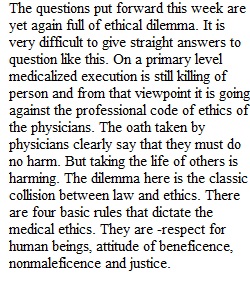


Q Week 6 – Discussion As we've discussed this week, throughout the history of capital punishment, a variety of methods have been used to carry out executions. The gas chamber, firing squads, and hanging have all been used in the United States and continue to be used in other countries. In 2000, lethal injection or "medicalized execution" became the standard method of execution in the United States. Although it is argued that lethal injection is more humane than earlier methods of execution, the use of medical knowledge to kill people has created conflict among medical professionals and penal officials. Executions involving lethal injection generally require the presence of a physician. • Should physicians participate in executions, or does this require them to go against their professional code of ethics - specifically, the principle of nonmaleficence or "do no harm"? • If not physicians, who should perform executions? • Or does the principle of nonmaleficence forbid anyone from executing another person? • How do human rights and societal rights factor into this issue? Support your answers using any of the ethical theories or concepts we have discussed thus far including but not limited to virtue ethics, utilitarianism, deontology, social contract theory, and so on.
View Related Questions